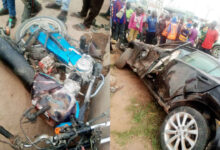Mohbad: An auxiliary nurse describes how a Nigerian singer passed away following a tetanus injection

Feyisayo Ogedengbe, an auxiliary nurse, testified during the coroner’s inquiry into the death of the late Nigerian musician Ilerioluwa Aloba, well known as Mohbad.
As the musician resumed his appearance at the Magistrate Court in Ikorodu, Lagos, on Saturday, the nurse disclosed comprehensive facts about how he died.
Giving her testimony, Ogedengbe informed the crooner, led by Magistrate Taofikat Adedayo Shotobi, that she received her nursing training at Cornerstone facility in Akute, Ogun State, from 2014 to 2017, following which she worked for the facility for a year before relocating.
According to her, on September 11, 2023, one of her clients, Ayobami Sodiq, aka ‘Spending’, asked her to provide a Tetanus injection to a friend of his who had been hurt on his hand.
According to her, Spending suspected that a shard of glass was embedded in the hand.
Ogedengbe stated that she was unable to go there that day due to severe traffic, but she arrived the next day, September 12th, at around 2.30pm, and met with the patient at Orchid Estate in the Lekki area.
She claims she had no idea her patient was Mohbad until she arrived and learned it was the singer’s house.
She told the court that the people she met that day were Mohbad, the singer’s wife, and his buddy Ayobami, who were all in the same room.
Further explaining, the nurse stated that she noticed the lower part of Mohbad’s right hand was swelled and administered the tetanus shot intramuscularly to his upper arm.
She stated that before administering the medicine, she asked the singer if he had an ulcer, and when he responded “yes,” she decided not to give him a diclofenac injection, but rather a paracetamol injection.
She stated, “I gave Mohbad 4ml of paracetamol and Iml of water, for a total of 5ml, which is the typical dosage for adults, and I gave him intravenous (into the vein). I diluted the ceftriaxone injection to 10ml and administered it to him slowly.
“I explained to Mohbad and his wife that the paracetamol and ceftriaxone injections were to relieve pain and treat a bacterial infection; he was uncomfortable since his arm was swelled.
“Mohbad expressed a desire to vomit while receiving the ceftriaxone injection, which he had received up to 2ml of. I was astonished by this statement, but because that was how he was feeling, I decided to remove the injection, and he went to vomit in the toilet before returning to sit on the floor in the room.
“When Mohbad returned from the restroom, where he had gone back to vomit and sat on the floor, I noticed goosebumps all over his body. I was astonished and showed his wife the goosebumps, to which she replied that it was his regular reaction to injections and that if we poured water on him, he would recover.
“The wife then took him to the bathroom and began pouring water on his head, at which point she informed Ayobami (DJ) that we should go to the nearest pharmacy.”
“There was no vehicle on the premises to convey her and Ayobami to the nearest pharmacy, and as a result, we had to run to the nearest pharmacy where I wanted to get hydrocortisone and saline infusion at the pharmacy to treat the allergic reaction of the goosebumps and help Mohbad with dehydration.”
She admitted that when they arrived at the next pharmacy, they were unable to obtain a hydrocortisone injection and a Normal Saline infusion, prompting her and Ayobami to rush back into the estate to find another pharmacy because the first one did not have the medication she required.
“When we arrived at the second pharmacy, we were able to get a hydrocortisone injection and a normal saline infusion, and it was around 3 p.m. Ayobami (DJ) was taking calls, and I heard him say Mohbad was convulsing. I instructed him to tell the person he was speaking with, and that arrangements should be made to transfer Mohbad to the hospital,” the nurse added.
“That by the time I and Ayobami returned to Mohbad’s residence, he had already been transported outside, so the hydrocortisone injection and normal saline infusion could not be provided.
“At this time, I didn’t have access to go back into Mohbads’ house because everyone was already outside, and the aim was to get Mohbad to the hospital as soon as possible.
“Mohbad did not convulse in my presence or when I returned to the house. There was still no vehicle to transport us to the hospital, so Mohbads’ neighbor offered to assist us,” she explained.
She stated that on the trip to the hospital in the neighbor’s vehicle, she sat with Mohbad’s wife in the front passenger seat, while Adura (Mohbad’s brother), Ayobami, and Mohbad were in the rear seat.
“There was terrible and heavy traffic on the road that day, so Mohbad had to be put on a motorcycle to get to the hospital.” Due to the heavy traffic, I had to get out of the neighbour’s vehicle and begin running after Mohbad’s motorcycle. “It took about 20 minutes to get to the first hospital,” she explained.
“When we arrived at the first hospital, the medical workers on the scene initially refused to respond to him, almost causing mayhem, but they later attempted CPR (cardiopulmonary resuscitation) on him in the hospital. Following CPR, the doctor declared Mohbad brought in dead. I became astonished and perplexed.
“The doctor on call at the first hospital approached me and inquired what meds I gave Mohbad. I told the doctor about myself, the drug I gave Mohbad, and the dosage that was supplied.
“Darosha then met us in the first hospital, and Spending was on his way there. When Darosha arrived and learned that Mohbad had died, he refused to believe it and insisted on bringing him to another hospital.
“Mohbad was loaded into Darosha’s truck; there wasn’t enough space for me to follow, but I recall Mohbad’s wife following Darosha. I and Ayobami spent time in the Uber he arrived in, while Ayobami called someone in Darosha’s vehicle to find out where they were.
“We ultimately learned that Darosha had taken Mohbad to another hospital, Osapa London in Lekki. Due to heavy traffic, it took approximately 20 minutes to reach the second hospital. Normally, it would not have taken us more than 10 minutes.
“By the time we arrived at the second hospital, it was around 6 p.m., and we saw Darosha and some of the individuals that followed him. Mohbad was outside the hospital because the hospital’s management refused to allow Darosha to bring Mohbad inside, despite the fact that the medical personnel on the ground looked for a pulse on Mohbad and found none.
“The doctor on call at the second hospital invited me in and advised me to sit at the reception. While other people were outside the hospital, the doctor asked me what had happened, and I told everything to her in the same way that I had explained to the doctor at the first hospital.
“After speaking with the doctor in the second hospital, she asked to talk with two family members. So she spoke with Darosha and Spending.
“We spent approximately an hour at the second hospital before I departed to go back to Mohbad’s place. It was already nighttime, around 7 p.m. Mohbad’s body was taken back to the residence at 8 p.m. There were a lot of people in the house at the time, and they were all outside. Mohbad’s lawyer arrived to see us at the residence.
“At around 9 p.m., I, Ayobami, my cousin (a lawyer), and Mohbad’s lawyer went to the police station in Orchid Lekki and the first hospital to where Mohbad was taken.
“When we arrived at the Orchid Lekki police station, I narrated all that had happened to the officer who attended to us.
After recounting all that transpired to the police officer who assisted us, the officer asked Mohbads’ lawyer and Ayobami if they wanted to file a complaint against me or have the incident investigated. They replied that they weren’t sure yet.
“The police officer then referred us to Ajiwe Police Station in Ajah if we needed to file a police report. I’m confident that Mohbad’s lawyer will provide a full report on the efforts to obtain Mohbad’s police report and death certificate,” she added.
Following her testimony, she was cross-examined by counsel for Mohbad’s family, Wahab Shittu (SAN), counsel for Mohbad’s wife, Kabir Akingbolu, and counsel for the state.
The case has been postponed until March 21, 2025, for additional proceedings.







